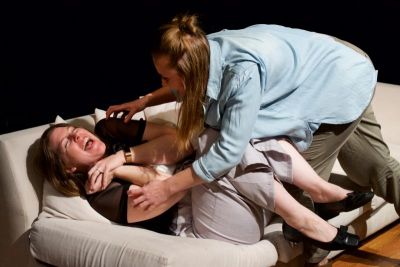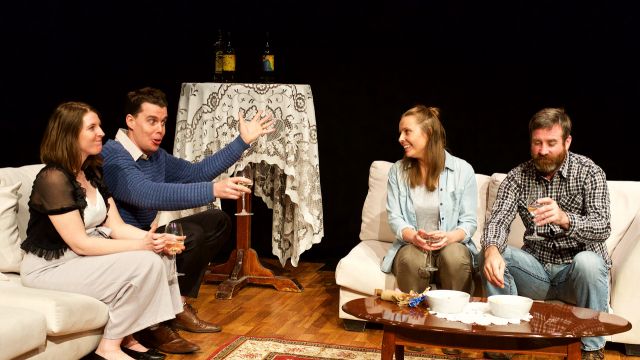Peggy Pickit Sees the Face of God
Two couples, two dolls and too much wine are the foundations of this unusual play that tries to examine culture clash and colonialism from the perspective of failing relationships. Peggy Pickit is one of the dolls, a favourite toy of the five-year-old daughter of one of the couples, and now a gift to an African girl that was being cared for by the other couple, recently returned running from the developing world. That couple presents the parents with the second doll – wooden and simple; these two toys become the crude proxies for the different worlds inhabited by the two couples.
Carol (Krystal Brock) and Martin (Brendan Cooney) are married doctors who, after the last six years working at a medical facility somewhere in Africa, return to the West – and to a dinner party hosted by their old friends Liz (Lucy Markiewicz) and Frank (David Hirst). These two have spent the same six years with a mortgage and a child, their daily excitement measured by whether the garage door is up or down.

During the foursome’s disastrous dinner party the small talk is punctuated by asides from each of the characters. One of the characters will find a spotlight on them, turn to the audience, and narrate what’s really being said, or unsaid, whilst the other three are frozen in the shadows behind. This constant breaking of the fourth wall and vocalising the subtext shatters any tempo that may have been building, then returning not to where the four characters were before the interruption, but instead, repeating the last two or three lines, became increasingly irritating and patronising. Adding to the mental gymnastics required to navigate the story, the asides are not always chronological – foreshadowing a dramatic event to come, or just repeating something that’s already been said.
Krystal Brock is our best pilot here, showing Carol’s honesty, confusion and compromise in fighting against an unnamed epidemic and for her principles. David Hirst’s Frank is also good at being a man hiding his true feelings behind distractions, his exaggerated physicality making us deliberately uncomfortable. Brendan Cooney’s introvert (or maybe PTSD survivor?) drinks a lot more than he says and Lucy Markiewicz plays the nervous and sometimes creepy Liz well, and then shouts a lot.
The play is written by the German playwright Roland Schimmelpfennig, and it tries too hard to deal with the challenges of marriage and how Western nations “help those less fortunate”. There’s a chink of light in a discussion on neo-colonialism, the disbelief from the financially comfortable Liz and Frank on how Carol and Martin’s medical expertise wouldn’t be welcome – but unfortunately this is only passing. It’s left as a marker that’s occasionally revisited through the play, but never properly explored.
 Nor is the breakdown of the two marriages examined beyond the superficiality of the angry accusation “you had an affair”, parried with a predictable “so did you”. With each couple taking a different path – safe or worthy – their relationships seem to have ended up the same, with immense dissatisfaction, furious resentment, and rarely contained contempt. The microcosm of Western society portrayed here tells us that whichever path you go, you won’t find happiness in either vocation or procreation.
Nor is the breakdown of the two marriages examined beyond the superficiality of the angry accusation “you had an affair”, parried with a predictable “so did you”. With each couple taking a different path – safe or worthy – their relationships seem to have ended up the same, with immense dissatisfaction, furious resentment, and rarely contained contempt. The microcosm of Western society portrayed here tells us that whichever path you go, you won’t find happiness in either vocation or procreation.
Director Joh Hartog simmers his actors better than the inevitable boilovers, and the naturalistic dialogue works well when they’re relaxing on the sofas and sitting around the dinner table. The director’s set is functional for the one scene play and Stephen Dean’s lighting shines best when the spotlight finds the asides.
It’s admirable to offer drama that gives the brain a workout, and this play should be something that presents questions for and challenges to our attitudes and beliefs, keeping us awake long after the final curtain, but before those dilemmas are properly formed, the lights fade to black.
Mark Wickett
Photography by Michael Errey
Subscribe to our E-Newsletter, buy our latest print edition or find a Performing Arts book at Book Nook.

